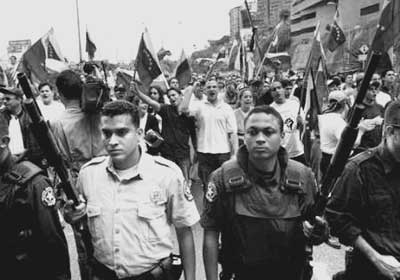![]()
Write us!
socialistviewpoint@pacbell.net
A Report From A Venezuelan Marxist
The following excerpt was taken from a longer report and published by In Defense of Marxism. Coming as it does from a participant in the struggle for revolutionary change it sheds more light on the pre-revolutionary crisis in Venezuela.
In my opinion our country is passing through a pre-revolutionary situation. In reality the working class and the people now have almost all that is necessary, except a revolutionary leadership, which at this historic moment in the history of capitalism, is absolutely necessary in order to overthrow the capitalist regime. On the other hand, since April 13, there has been a continuous development of organs of popular power, with thousands of Bolivarian circles, land committees, popular assemblies, class currents, all sorts of political movements, etc. Nevertheless, this process also reveals the inexperience of the popular movement, showing serious organizational weaknesses within it and, what is even more serious, a great lack of coordination between its component parts.
Another important factor to take into account is the dead weight of the messianistic leadership of Chavez. (...) This dramatically shows up the lack of a revolutionary party and, at the same time poses the urgent need for the mass movement to create a popular action front, to articulate the popular and working class organizations, and to discuss a plan of action against the coup conspirators, and out of such a front, to begin to work towards the construction of the party, a task which is still only in its early stages. Another element that must be borne in mind is that the organized workers’ movement is not yet the vanguard of the process. There are unions and class currents that have developed over the last year but they do not yet represent the workers’ movement as a whole.
Here too one feels the lack of a revolutionary party.
The hub of the mobilization against the conspirators is still the popular organizations, that is, the Bolivarian circles and committees in the poor areas of the main cities, and also the rural organizations and semi-urban communities (i.e., the shanty towns) but the workers’ movement as such is not the vanguard of the struggle. (...)
As far as the present situation is concerned, I can tell you that the strike was a failure. At the moment, it has only affected 16 percent of the labor force. Nevertheless, the conspirators have concentrated on the oil industry (PDVSA) where they have caused some problems without having succeeded in paralyzing the whole industry.
In Caracas, above all in the commercial sector in the east of the city, the stoppage was significant, however, in the poor areas the majority of shops were open, and even the banks were open with only a few exceptions. In the interior of the country the defeat of the strike was even clearer and more striking. For instance, in the prairie country of Apure and in Guayana, where the basic industries are concentrated (iron, steel, aluminum, electricity), the industries in Fedecamaras did not support the strike.
Since yesterday, in an action that reflects desperation but also the pressure of the most right wing section of the Coordinadora Democratica (Democratic Coordination), Carlos Ortega called for an active strike, which was translated into violent acts in some cities, especially Caracas. This means that they are trying to create a situation of chaos on the streets in order to provoke eventually a military coup, combining this with an attempt to sabotage the workings of the PDVSA.
On the military plane, we believe that they do not have the strength to carry out a coup, or they would have already done so. As for taking over the factories, this has not taken place. The reports concerning Pepsi Cola turned out not to be correct. Although the article appears to me to be correct in general terms, the final proposals, although correct, are of a propagandist character at the present time. We must bring them down to earth and adapt them to the specific situation in which the process now finds itself. In this sense we are proposing another April 13. We are calling for an emergency conference of workers and popular organizations to discuss the formation of a people’s action front, with a plan of action and an economic plan and a social alternative, while at the same time calling for a mass mobilization next Saturday. In this way we think we can give a more concrete character to some of the points you (the author of another report on Venezuela appearing on the same website) raise in the article.
With revolutionary greetings,
M.
—In Defense of Marxism, December 6, 2002
 |
| Venezuelan policemen guard demonstrating opponents of President Hugo Chavez who are blocking a highway in Caracas on December 16, 2002. The attempts to overthrow Chavez have infuriated his supporters who are here held off by the armed police. Chavez supporters are very rarely shown in photos. The stoppage is aimed at disrupting the economy and has slashed Venezuela's oil output to less than a third. The actions were called on December 2 by business leaders. Photo by Kimberly Whit / Reuters |
Write us
socialistviewpoint@pacbell.net